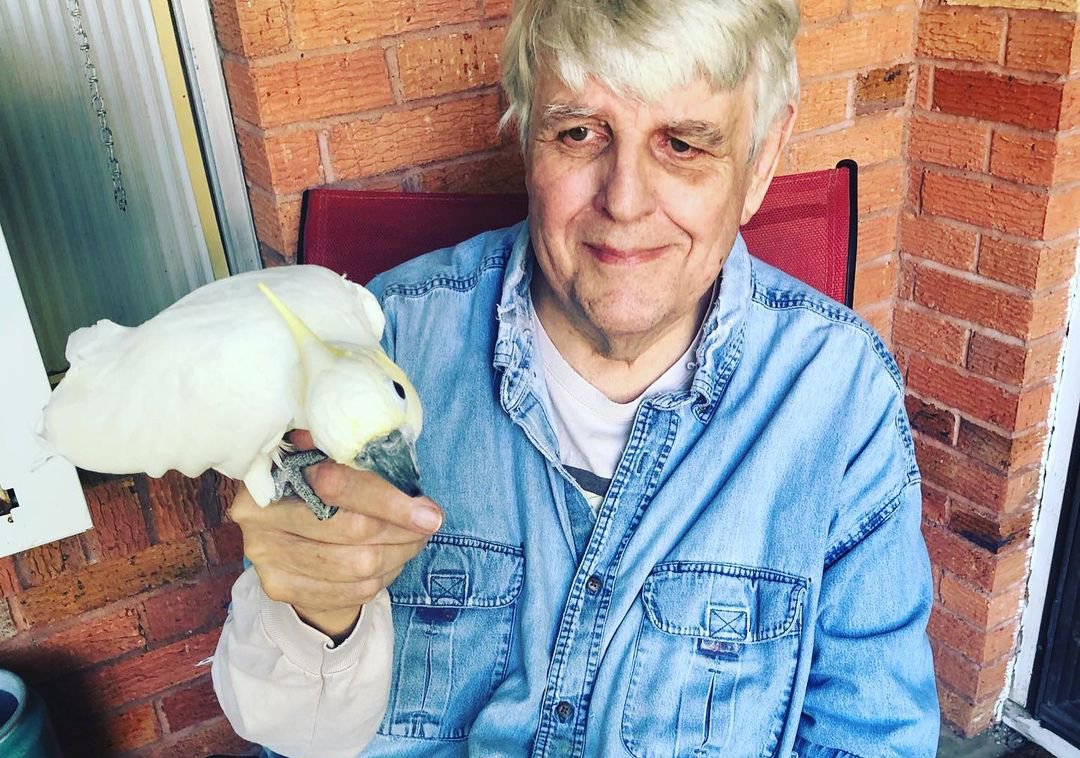By Lori Salazar
Dan Peeler
Few people can say that they grew up on a farm in North Texas and went on to meet film idols like Bette Davis, Joan Crawford and even the voice of Bugs Bunny. Dan Peeler, a professional puppeteer and filmmaker, has met many memorable characters during his career in film, animation, and puppetry, and even re-designed the iconic character Chuck E. Cheese. He has created memorable animated series and movies for the Disney Channel and PBS, including Sesame Street, while pursuing a life-long passion for film, children’s programming, and LGBTQ-affirming education.
Originally from Dallas, Dan Peeler grew up with his family on a five-acre farm on the edge of Pleasant Grove. His parents grew a variety of crops, including corn, turnup greens, and other crops that were sellable to grocery chains in the 40’s and 50’s. His parents personally knew the individuals who started Tom Thumb because of their farming business. Dan and his brother both attended Southern Methodist University (SMU) through profits the family made from their farm.
Peeler didn’t label himself to be “homosexual” since people in his hometown often labeled “men who were effeminate as homosexuals.” In an oral history interview conducted by The Dallas Way he says that “you were either homosexual or others called you by the derogatory term fairy.” He recalls how people around him often said ““oh, it’s something you choose” when discussing being gay. Although Dan knew he “absolutely did not choose to be gay” because being gay in the sixties was difficult. Peeler remembers “guys at school who were effeminate” and that he made sure to “treat them well” because he felt they were being marginalized. He said that growing up as a gay teenager, he didn’t attempt to hide it because “I just was who I was.” He refused to let labels define who he was because he considered himself as an artist who was interested in animation and other creative passions.
In high school, Dan Peeler was involved in various clubs including the art club and theater. He learned how to sow and create puppets from his mother, which helped him become a professional puppeteer for live shows and television programs. He exclaimed that “my mother and father were extremely encouraging to me” because “it didn’t matter to them” if he was gay. It was a subject that was never discussed. Dan remembers in the 1950s when he was around seven or eight years old asking for a dollhouse for Christmas. He remembers fondly that his father built him a dollhouse with no questions whatsoever. While growing up, Dan also remembered that he was attracted to the football players in his high school and didn’t find out until years later that some of them were gay. He recalls that people in school “didn’t talk about it in those days” and didn’t even know about the Stonewall riots until thirty years after they happened. They were not mentioned in the local newspapers.
For his first year of college, Dan Peeler went to Arlington State College, which is now UT Arlington. He met a lot of LGBTQ+ individuals in the art department. His parents wanted him to go to SMU and he was talked into transferring by his mother. He said at the time, some of his friends that he knew to be gay at Arlington State were getting married because everyone wanted to conform to society’s traditional standards for men. Dan felt that because he was a part of the art community he didn’t feel as if he had to conform to anything and has never gotten married. In the mid 1970s, Peeler moved to Oak Lawn, which was known for its vibrant LGBTQ+ community. Dan recalls that he “never really had a reason to formally come out.” He remembers always being out with the people in the art community. As an Oak Lawn resident, Peeler was able to meet other artists in the neighborhood who were also interested in film and animation, starting a film society, Sons of the Desert, which was a branch of the Laurel and Hardy appreciation society. He became a producer and director at a film company called Bill Stokes Associates after he graduated from SMU. Dan recalled how he worked at the production studio on staff for over ten years as a freelance producer and director and afterwards when he started his own company. As his years as a producer and director he also hired other gay artists and filmmakers while living in Oak Lawn.
At the age of 22, while working in the film industry, Peeler met Joan Crawford who was filming a commercial for Pepsi, a company that she owned at the time. In response to his praise for the iconic actress, Peeler recalls that Crawford bought Peeler a Pepsi, as he gushed: “When I saw What Ever Happened to Baby Jane, I believe they stole that Oscar from you because you needed to win it.” Miss Crawford was pleased.
Charlie Rose
Peeler was producing animated commercials and industrial films in the ‘80’s when he met a man named Charlie C. Rose, who became his business partner and has remained so for over 40 years. They originally met at the Reinhardt Bible Church in the very conservative area of Garland, TX. At the time when they met, Peeler was not only producing animation but also puppet projects. Rose became interested in his work with puppets. With Rose, they became very active in the Lone Star Puppet Guild, which Peeler had started in the early 70s, and created countless puppets for the film and entertainment world. They created puppets for Six Flags Over Texas for the Kroft marionette theatre, shows for the State Fair of Texas along with three animated shows for the Disney Channel. With Bobby Goldsboro, a Grammy Award winning country musician and composer, they created the PBS animated series called Swamp Critters of Lost Lagoon for three seasons.
With his successful career in film and animation, Dan says he remembers being itempted to move to Los Angeles, but he remembers being put off by the L.A scene because he felt uncomfortable about the large amount of drug use in the film industry. During this time, he was offered a job with The Muppets in New York and was also offered to work for a couple of studios in L.A. He decided instead to keep his animated work to Dallas. He and Charlie had produced a 1991 animated special called Easter Egg Moring with Goldsboro. Dan remembers that it was the first national animated special ever produced in Dallas and it ran on the Disney Channel as their early morning Easter Special for many years. Dan realized that “if you worked hard enough, it doesn’t matter where you did animation.” He remembers some of his friends and co-workers that started DNA productions in Dallas which created Nickelodeon’s cartoon show Adventures of Jimmy Neutron, Boy Genius.
During the 80s, he noticed many of his friends and other talented co-workers in the film and animation business began to get sick. During the AIDS crisis, he remembered everyone around him dying from an unknown disease. “In those early days,” Dan recalls, “it was a very big surprise for all of us” because at first HIV and AIDS was labeled as “a gay disease, which of course it wasn’t.” He says that the artist community was devastated because “people that you’ve worked with for years and watched them be successful” were suddenly dead. Dan recalls losing over thirty friends during this time, saying that most people he knew in the artist community died in the late 80s and early 90s. He remembers Stan, a friend and brilliant art director at Boston Magazine was one of the first people he knew personally who contracted HIV during the AIDS crisis. Dan recalls that “I had a lot of counseling sessions in those days” and that the emotional toll of the AIDS crisis led to a deeper investigation of his spirituality.
While Peeler had been a Christian his whole life, in the midst of the AIDS crisis, he decided to attend seminary and later discovered Brite Divinity School where he enrolled. In the late 1990s, he discovered the liberal theology and LGBTQ-focused ministry of Cathedral of Hope. As a man who grew up Presbyterian with the King James Bible, Peeler was interested in a church that wanted to cater to LGBTQ+ individuals and he soon felt called to establish, along with Rose, a vibrant children’s ministry at the church, where he worked for over20 years until 2020. Peeler worked to give children and their parents a space to learn about how the Bible can offer messages of acceptance, love, and compassion for all people, including LGBTQ+ individuals.
Peeler says he is glad to see how societal views about LGBTQ+ people are changing and how he can see it being reflected by the progressive churches’ accepting congregations. He says when he began the children’s ministry in the 90s, he saw “many parents at odds with their children” being LGBTQ+ who“were often thrown out of their homes.” Today, he says, “many parents are a lot wiser” and more of them know that they need to accept their children for who they are, “especially if they want to see their own grandchildren”. Currently, Dan Peeler and Charlie Rose are writing and illustrating a series of books for middle school + children called The Dragons of Romania. Peeler continues to teach acceptance, love, and compassion to children today in a variety of creative projects.
= = = = = = = = = = = = = = = = =
Lori Salazar is a writing and film graduate at Texas Christian University. Before she was an intern at the Dallas Way, she previously interned at the San Antonio Current as a film critic and writer. When she is not reading or writing, she is either watching an old black and white movie or walking her English bulldog named Bubba.




